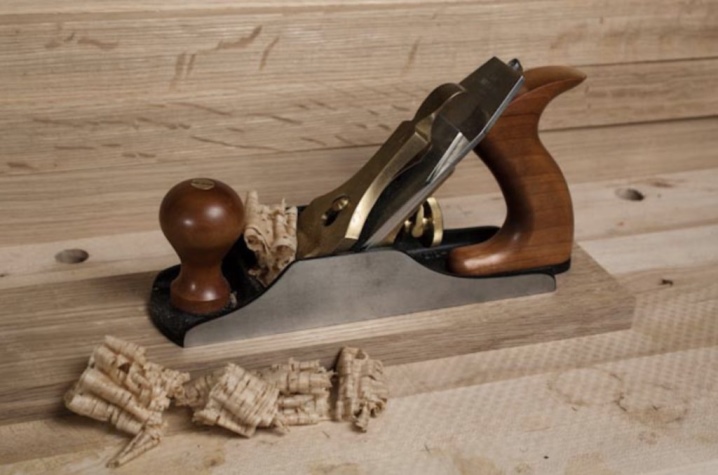What is a kalevik plane and how to use it?

A huge number of wooden products are made by human hands. But not everyone knows how these or those decorative elements are obtained. And even more so they don't know what it is kalevka plane and how to use it. Indeed, despite the fact that carpentry is a wonderful hobby that gives you the opportunity to escape from intellectual work, not everyone has the skills of a home wood-breeder.

What it is?
First, you need to understand what does "kalevka" mean... There are several concepts at once under this name. It:
- method of processing wooden surfaces;
- the name of the instrument;
- the type of the resulting curly cut.

Generally, moulting is a method of wood finishing, as a result of which a variety of profiles, decorative grooves, original grooves, grooves for joinery joints (tongue-groove) are obtained.

For example, a door leaf with panels, bulges and graceful grooves is the result of moulting. With its help, the following products are made:
- window cornices;
- door leaves and platbands;
- skirting boards;
- some elements of furniture;
- decorative baguettes;
- frames of wooden windows.
In an industrial environment all these techniques are performed on machines or on special workbenches. A at home they are created by a tool called a moulder or moulder.

For example, in door structures, the following details are processed with such a plane:
- platbands (to create smooth curves);
- panels;
- fasteners;
- box;
- canvas.

It is a lightweight and beautifully crafted tool with a curved cutter... In fact, this is a simple plane, which differs from the classic one in that it is designed for processing profiled surfaces. It consists of the following elements:
- wooden block;
- tap hole (slot with a sharpened plate through which the shavings exit);
- metal cutter;
- wedge (clamp fixing the position of the knife);
- regulators for the depth and width of cut;
- chipbreaker;
- handles (back and front);
- support for the index finger (to prevent the appearance of calluses);
- "Frogs" (a plate that regulates the angle of inclination).

Shoe and wedge tools are made of hardwood (ash, maple, acacia, sapele). Kalevka planer covered primer oil and wax. Its lower surface is equipped with sharp blades which carefully remove a layer of wood in accordance with a given shape.

Variety of received profiles - huge. Baguettes, cornices, fillets, humpbacks, half-rolls - all these are kolevochniki. They differ only in the shape of the sole.
How to choose?
The kalevka plane is an ancient invention. It appeared in Russia thanks to the great reformer Peter I, who himself found solace in carving various objects out of wood. It was after its innovation that the widespread use of the old instrument and its constant improvement began.

Finding a maker today in modern stores is not easy. Sometimes it's easier to do it on one's own, and at the same time create a moulting of an extraordinary section. Many craftsmen even now make such planes themselves and grind knives to create the desired curly shapes.

When choosing a tool, you must pay attention to certain criteria.
- Dimensions and weight... If more work is expected, then it is better to choose a lighter plane.
- Knife width. The area of the treated surface depends on it. Ideal if the blades are made of tool steel.It is strong, durable and holds the sharpening angle for a long time.
- A pen... It must be ergonomic so that the hand does not get tired during the process.
- Smoothness and flatness of the sole surface. The quality of the product largely depends on them. You should be especially careful with metal soles. If a mistake is made during casting, such a defect cannot be corrected by grinding, as is the case with wooden products.

How to use?
The planer design is simple. It consists of pads with sole... Installed at the ends two handles... The front is made for holding with the hand, the back for pushing movements.

At the very beginning of the operation of the molding machine, it is necessary to observe some rules.
- Adjust the height of the knife extending from the hole in the sole. The more the blade protrudes, the thicker the layer of material is removed, and the surface quality is low. And if too thin chips come out, then the machining process takes longer.
- Fix the workpiece properly in the workbench clamp.
Further, the processing process itself takes place. Planing should be done parallel to the table. When working, it is important to evenly distribute efforts and maintain a given line of direction. At each stroke, a layer of wood is removed along the surface, corresponding to the amount of extension of the cutter and its angle of inclination. At the end of the work, the tool must be cleaned of chips.
Wooden planes should be stored in rooms with low humidity and without sudden changes in temperature. This is necessary in order to prevent warping of the wood.


It is also recommended to periodically check the geometry of the wooden blocks and soles and monitor the fit of the wedge to the knife and tap hole... If necessary, the surfaces can be smoothed by smoothing or grinding them.
An overview of the crippled planers is presented in the following video.













The comment was sent successfully.